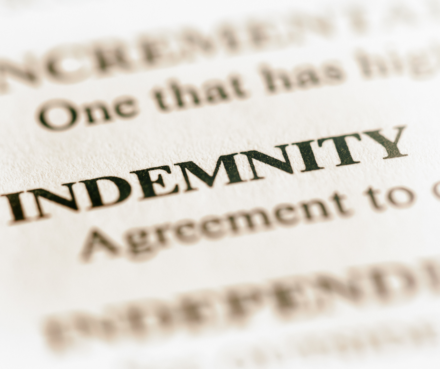
How to deal with a dispute arising from an indemnity
28th March 2024 by Brendan Herbert
As a business owner you may well have been given the benefit of an indemnity in any of your commercial agreements. Indemnities can be a valuable method of obtaining some assurance that the company or person giving the indemnity will compensate you on a certain event happening.
‘However, sometimes there will be a dispute over whether you can invoke your indemnity clause, or over what level of compensation is actually due,’ explains Brendan Herbert, head of the Dispute Resolution team at Laceys Solicitors. ‘When this happens, it can be complex to resolve and there are several factors to consider.’
Brendan looks at the options for your business if you believe an indemnity in your favour has been breached and considers what compensation might be due to your business as a result.
What constitutes a breach of indemnity?
Indemnities are used frequently in commercial contracts to provide a contractual obligation on the provider of the indemnity to compensate for a defined loss or damage, usually if a particular event occurs which requires you to be compensated. Your business may well have the benefit of an indemnity in many of your commercial contracts.
An indemnity in your favour will secure you against any losses which fall within the scope of that indemnity. For example, if you have contracted with a manufacturer to provide you with a newly designed furniture range, but another company has accused the manufacturer of copying their design. If it turns out that there was a breach, meaning you can no longer sell that particular range, you would be entitled to be compensated under your indemnity clause.
How can a breach be proven?
If the indemnity clause in the contract is clear on what it is covering, then breach should be fairly easy to prove. Often the indemnity will state what action will cause a breach, so the wording will be key. Look out for wording such as ‘caused by’, ‘arising out of’, ‘as a result of’ or ‘in connection with’ in relation to a specific event. If the wording is ambiguous, proving a breach may be more tricky, but not impossible, depending on the circumstances.
A straightforward indemnity, indemnifying you against money you may have to pay out in the future on the occurrence of a specific event requires little by way of proof. For example, if you are buying a business and the sale agreement includes an indemnity that any legal claim brought against the business arising from activities in the period before the date of the agreement will be met by the seller, then it is probably a simple case of looking at the dates over which you are being asked to pay compensation. If this refers to a time before you bought the business, then it should be covered by the indemnity and therefore you can reclaim this from the seller under your sale agreement.
It is harder when a claim is for unknown financial compensation rather than a clearly defined sum of money. For example, if you operate a distribution agreement for a manufacturer, and you have the benefit of an indemnity on the basis that you will be the sole distributer of their product in a particular geographical area. If that manufacturer then allows a competitor to distribute in the same region, you may be entitled to financial compensation for the damage this has caused to your profits (or potential profits). However, you will need to prove that financial loss has actually occurred, and you must be able to clearly show how much loss you suffered by demonstrating the effect on your turnover as a result of this breach. The court will look at whether your turnover might have been affected by other market conditions anyway, and if so there may not have been a cause and effect even if there was a breach. If that is the case, you will not be able to prove the ‘causation’ element necessary to be awarded compensation.
In addition, the loss cannot be too ‘remote’. This means that the loss must have occurred in the usual course of your business and must have been contemplated by the parties at the time the contract was executed.
What losses have been caused?
To assess what losses have been caused will depend on what the indemnity clause covers. Some indemnities are very clear and the resulting damage is also clear. For example, if you have been assigned a lease from a former tenant for your current business premises, you may have acquired an indemnity within that assignment that provides for the former tenant to pay for any arrears that arose while they were in the premises, if these are later claimed against you by the landlord. This would be considered a ‘debt claim’, because the loss is clear and so you can simply demand the money you have lost against the previous tenant, under the assignment.
However, as set out above, some indemnities are not so clear, particularly where losses are undefined and amount to damages, rather than an easily calculated debt. In this case, the losses will need to be considered carefully, and either agreed between you and the indemnifier, or assessed by a court if you cannot agree.
Is there anything that might limit the damage you can claim?
Where the indemnity simply arises as a debt to you for an easily calculated sum, then you have no obligation to mitigate your losses, or prove causation. For example, if you are a landlord and under the lease agreement your tenant has agreed to indemnify you if you incur certain expenses, such as having to paint the exterior of the building every five years. This is clearly a debt claim, and you would have no obligation to mitigate those expenses by hunting around for the cheapest contractor.
However, where the court has to assess the value of any damage (such as loss of sales for the furniture range, if we take the earlier example), and therefore whether the terms of the indemnity actually capture it, the court will look at issues such as causation, and remoteness as mentioned above. It will also look at whether you have done anything to mitigate the damage you have suffered. If any of these fall short, you may not achieve the full amount of your claim, or it may be reduced to lower than you expected.
What are the options if you think an indemnity in your favour has been breached?
Often the way of resolving an indemnity dispute will be set out in the contract itself under an agreed dispute resolution clause, so that is where we would start.
As soon as you believe an indemnity clause has been breached you should take immediate legal advice on your options. If it is ignored for too long, it may be claimed that you acquiesced with the breach by not objecting to it. In addition, any delay will just increase the damage being caused to your business.
Our approach is to review with you what is the most cost effective and speedy way of resolving the dispute, starting with negotiation around settlement, and considering whether mediation may help resolve the situation faster than court action. Obviously if this does not succeed, we will look to initiate a claim in court to provide you with the solution you need.
How we can help
It is important you seek immediate legal advice from our litigation experts, so that we can advise you on your options, on whether an indemnity is likely to have been breached, and to assess with you what value of financial compensation for your loss may need to be claimed for your business.
We will consider with you all of the variables, and advise you on how best to proceed in the circumstances.
For further information, please contact Brendan Herbert on 01202 377810 or via email at b.herbert@laceyssolicitors.co.uk
This article is for general information only and does not constitute legal or professional advice. Please note that the law may have changed since this article was published.



